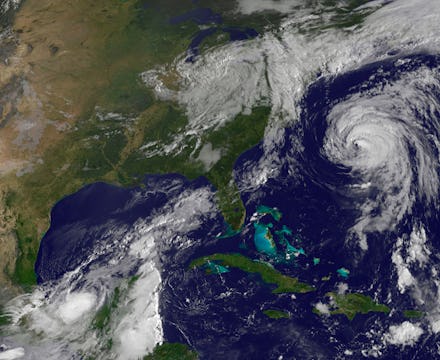The UN Has Released A Global Warming Report, And Things Are Getting Even Worse

On Saturday, the world went dark for a while as over 7,000 cities in 150 countries unplugged for Earth Hour. The movement, which has grown significantly since its inception in 2007, represents a growing global consciousness regarding climate change — although the situation looks as dire as ever, and will likely only get worse.
Saturday also happened to mark the conclusion of the UN Intergovernmental Panel on Climate Change (IPCC)'s meeting in Yokohama, Japan. The 195-member panel's assessment report, which had 243 lead authors from 70 countries as well as tens of thousands of expert comments, was released on Sunday, painting a stark picture of the impact of climate change on the environment.
According to the report, the main cause for concern is CO2 and other greenhouse gas emissions from deforestation and fossil fuel consumption. Man-made climate change has already contributed to rising levels and increasingly acidic oceans; if left unchecked, it has the potential to devastate the food supply and lead to further food insecurity and conflict. Wheat and maize production have already been affected by rising temperatures and heat waves.
Wheat is the first big staple crop to be affected by climate change, and acts as a canary to a wider problem. Projections suggest that wheat yields could drop 2% a decade because wheat is sensitive to heat and is grown around the world, from Pakistan to Russia to Canada.
"Global temperature increases of 7.2 degrees Fahrenheit or more above late-20th century levels, combined with increasing food demand, would pose large risks to food security globally and regionally," the report said.
In the best case scenario, global temperature would increase by 1.6 degrees Celsius; in the worst case, it would rise by 3.7 degrees Celsius (6.6 Fahrenheit). The most vulnerable parts of the planet are expected to be hit the hardest, worsening existing problems such as air pollution, coastal erosion in low-lying areas and the availability of water in sub-Saharan Africa — leading to climate change-related migration, conflict and security issues. The panel warned that the problems caused by climate change are likely to grow substantially worse unless greenhouse emissions are brought under control.
"We're not in an era where climate change is some sort of future hypothetical," said Chris Field, a scientist at the Carnegie Institution who co-chaired the report's working group. "There is no question that we live in a world that's already altered by climate change."
The report also affirmed with 95% certainty that humans have "been the dominant cause of the observed warming since the mid-20th century." Recommendations included cutting carbon emissions, introducing effective irrigation and implementing flood prevention methods.
The report was welcomed in Washington. Despite opposition from conservatives, President Barack Obama is trying to use his executive power under the Clean Air Act and other laws to impose significant new limits on the country’s greenhouse emissions.
“There are those who say we can’t afford to act,” Secretary of State John Kerry said in a statement. “But waiting is truly unaffordable. The costs of inaction are catastrophic."